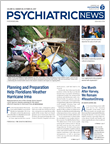Leadership is a skill. Although some would argue that leadership is innate, I disagree. I think that leadership takes training, and I’ve found the fellowship program of APA and the APA Foundation (APAF) to be a terrific opportunity to learn about leadership and networking opportunities within the APA community.
Leadership is cultivated through a combination of resilience, determination, friendship, and self-care. I want to share more about how I’ve taken advantage of the September Components Meeting, which was held September 13 to 16 in Arlington, Va. During the meeting—which is actually made up of many meetings—the members of APA’s components and leadership convene to work on issues of importance to psychiatry and our patients and forward APA’s mission.
This year is the first year I attended the meeting, and it was a blast! I participated in a one-day resident/fellow orientation and engaged in numerous stimulating conversations. Not only did I see familiar faces from Yale, but I also met with old friends from the residency interview trail. Also, I exchanged ideas with new friends who are doing groundbreaking work in advancing psychiatry. In addition to being inspiring, the colleagues with whom I engaged were thoughtful, caring, and passionate. The conversations and sessions in which I participated spanned numerous relevant topics. These included social determinants of health and personal experiences in health equity and diversity, just to name a few. I was particularly impressed with the information on resilience leadership, mentorship, and governance.
At the beginning of the meeting, I met with a group of bright-eyed folks who were Public Psychiatry Fellows and had come from as far away as Canada and Hawaii. We heard from Ranna Parekh, M.D., M.P.H., who heads APA’s Division of Diversity and Health Equity. One of the poignant thoughts she conveyed is the idea of “sponsorship” within mentorship—it refers to a mentor’s going above and beyond to do back-end work that will help a trainee become visible when that trainee might have otherwise gone unnoticed. Examples of “sponsorship” are sharing the trainee’s CV with the right person at the right time or talking about a trainee’s qualifications when being considered for a job. Dr. Parekh graciously encouraged us all to take advantage of the opportunity to network with each other and with APA leaders so we can form alliances, friendships, and mentoring relationships.
I also attended a keynote lecture by Beth Payne, J.D., of the U.S. Department of State’s Center of Excellence in Foreign Affairs Resilience. At first, I was skeptical at the relevance of the content; however, after hearing her lecture, I was sold. The work she presented centered on making use of existing research literature on resilience and applying resilience concepts to overcoming challenges, including those presented by natural disasters. Among the points she made were that leaders need to promote self-care; individual resilience does not equate to team resilience; and people can have a dramatic impact on the environment by modeling resilient behaviors such as applying a positive outlook. She also noted that all individuals can reframe situations for their own well-being and that of others. She further discussed the fundamental principles of developing social support, finding meaning and purpose, and using active problem solving. During a roundtable discussion, we focused on challenges that occur when discussing wellness/well-being with the people around us. In particular, we talked about the fear and stigma of telling a colleague that we are experiencing a problem or feel that something is wrong with us. However, we learned that the cost of not doing so includes jeopardizing patient safety and our residency as well as the health care system in which we work.
Beyond lectures and workshops, what I particularly enjoyed at this meeting was the opportunity to meet with other residents and potential mentors. For example, I had dinner with three fellows from three APA fellowship programs and had a long conversation about health equity and inclusion. I participated in a very insightful discussion on the importance of mentorship to be successful in medicine, particularly for minority trainees. We talked about the all-too-common micro-aggressions aimed at African Americans in the clinical setting and the need for professional dress codes that take into account cultural differences with the goal of overcoming racial and gender-based stereotypes and stigma among hospital staff. We also shared experiences that stemmed from our different cultural characteristics and upbringing—I shared what it was like to be a short, Asian psychiatry resident while my new friends recounted their growing-up experiences as Southerners. The discussion confirmed my commitment to promoting health equity and inclusion.
Beyond making new friends, I met some terrific mentors. I had numerous conversations with psychiatrists who support young physicians in their professional and personal journeys in psychiatry and were glad to share their knowledge. Francis Lu, M.D., of the UC Davis Health System discussed the use of films as a way to think about wellness/well-being in mental health. Geetha Jayaram, M.D., M.B.A., a former chair of APA’s Scientific Program Committee, gave me feedback about how to put together a strong workshop proposal for the Annual Meeting. I learned that she and I share similar interests in quality improvement and mental health systems administration. One day between sessions, I chatted with APA President Anita Everett, M.D., who encouraged my idea about developing a seminar for young psychiatry leaders through SAMHSA, the organization where she is the chief medical officer.
As the meeting came to a close, I was able to sit in on the Health Systems and Financing Committee and listened to an exciting discussion on collaborative care. Through friends, I was able to get together for happy hour with Altha Stewart, M.D., who is APA’s president-elect. She shared insights she had learned as a strong advocate for public sector mental health systems and discussed her initiative to engage residents/fellows during her presidential year. It was truly inspiring to hear her share her thoughts.
Although the story of my attendance at APA’s September Components Meeting is just one of many, I encourage all residents to consider applying for one of the APA/APAF fellowships. APA and the APAF have made a strong investment in these fellowships as well as in mentorship and leadership training. I am truly grateful for the relationships I’ve built through APA and plan to continue my involvement in the Association. ■
More information about the APA/APAF fellowships can be accessed
here. Applications may be submitted from November 1 through January 31, 2018.

